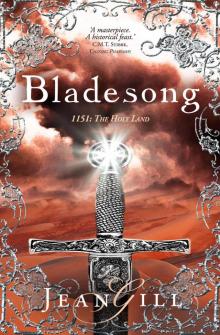Bladesong Read online
Page 14
Dragonetz was a soldier and this time Nur ad-Din would not read his eyes or his mind. He bent over the board and took his opponent’s horseman, placing him beyond the chequered squares, out of the game forever. ‘Your move,’ he said, while his heart told him, ‘A friend cannot be considered a friend until he is tested on three occasions; in time of need, behind your back, and after your death.’ and the words of another dead friend accused him ‘Why do you always have to win?!’ He knew the answer now, leadership and guilt, intertwined like leaves and stars in ivory. It’s who I am. He postponed the grieving until he’d won this game and focused once more on five moves ahead, when he would know for sure the outcome. Nur ad-Din took his Governor. ‘Check,’ he said. They were into the endgame.
Fewer options, more deadly choices, and Nur ad-Din was taking his time over every move now. Dragonetz was sure he had every option covered and allowed his focus to drift around the tent, the sounds of chit-chat and laughter crossing the barriers of his earlier intensity. A couple of men were analysing the chess game in whispers, close enough to see the board but far enough away to avoid distracting the players. Judging by their faces, the outcome was still uncertain and their bets likewise. Dragonetz’ gaze scanned the small groups, not needing to hear the words to see their moods highlighted in warm light and only half-hid in the shadows.
He shut his eyes and heard the music of the tent, the pool of silence enclosing him and his opponent, the amicable drone of male talk, bees on flowers, gathering news. His ears told him there was another note, soprano and anguished, suppressed tears, not a man. Eyes open, Dragonetz couldn’t hear it, but the plea for help vibrated in him, demanded his attention. The boy who’d served Bar Philipos was standing in front of the Syrian, no longer looking down but fixing Dragonetz with a wide, black stare, empty as the pits of hell, silent as endurance. Half-hidden behind him, Bar Philipos’ hands pursued God knew what exploration, unchecked.
‘Check,’ drew Dragonetz’ attention back to the board but not before his sharp-eyed opponent had noticed the direction of his gaze and drawn his own conclusions.
‘Do you want him?’ Nur ad-Din asked casually.
‘I lack a page boy,’ Dragonetz shrugged, lightly. ‘But no doubt he has a better future as a man in your service.’
‘They tell me he sings like a canary.’ A curl of the lip. ‘I have no interest in him or his singing so they’ll sell him on when they’ve cut his manhood to keep his voice sweet. It’s probably easier than rendering him mute.’ He gestured impatiently. ‘I’ll get another serving-boy, one who keeps his mouth closed.’
‘A fine future.’ Dragonetz’ voice was colourless. ‘But not as a man.’
A thought struck Nur ad-Din. ‘Shall I give him the choice? He may keep his tongue or his manhood and choose where the cut falls.’ Before Dragonetz could reply he added, ‘Or shall we change the bet, my Lord Dragonetz. Would you like this boy, in exchange for the Keter Aram Sola? Whoever wins our game? Come here, boy.’ The boy came. ‘Sing for the Infidel.’ His eyes never leaving Dragonetz’ face, the boy took a ragged breath and sang a couple of cracked notes, wincing at his own output. Nur ad-Din frowned and the boy shut his eyes, drawing the music from inside himself, singing a practice scale in all boyish sweetness, before starting a love song.
‘Enough!’ interrupted Nur ad-Din, slamming his hand on the blanket and the note, cut off in full soar, hung in the air. ‘Well?’ he challenged Dragonetz, who looked at the shatranj board and tried to shut all music out of his head.
‘Nur ad-Din’s reputation for justice has travelled oceans,’ he began slowly, as if a life hung on each word, ‘and we agreed that God would decide the fate of the book, through our combat. Such an agreement cannot be broken.’ Dragonetz felt, rather than saw, a trembling in the frail limbs of the child beside him. He continued in the same measured tone. ‘Should my munificent host decide to honour his unworthy guest with a gift, to complete the most memorable day of this Infidel’s life, I would be happy to relieve you of your inadequate servant, with his irritating voice. Nur ad-Din’s reputation for generosity equals that for justice.’
The frown lines cleared in the Muslim’s forehead. ‘I have men paid to flatter me,’ he observed, and Dragonetz knew he’d failed. ‘Nevertheless it pleases me to give you this nothing of a gift, this boy.’ Dragonetz felt the melody play in his own heartbeat. ‘If, by the grace of Allah, you win, you shall have book and boy. Your move.’
To the onlooker, Dragonetz had lost control. Each quick move was forced by a check to his shah. Yet Bar Philipos was black with anger at his protégé’s moves, and there was no smile on Nur ad-Din’s face as he made slow choices. Both had seen further ahead and no way out but to follow the path of Dragonetz’ making and hope for a mistake. There was no mistake. In the one move that Dragonetz was under respite from check, he retaliated. Now it was Nur ad-Din’s turn to seek shelter but each option was worse than another until Dragonetz moved his horseman, uncovering the concealed check and blocking the shah’s only potential escape.
Nur ad-Din toppled his shah onto its side and laughed aloud. ‘The knight has me!’ he declared. ‘May I learn from this lesson and may Allah’s will be done!’
‘Insha’Allah,’ Dragonetz agreed, sensing no change in the trembling boy beside him. If anything, he was hiding even greater fear, as he reached out and tried to stroke his new master’s arm suggestively, letting slip his robe to show a shoulder. Hiding his revulsion at this coquettish behaviour in a child, Dragonetz suddenly realised what the boy had been trained to do, why he might be afraid and yet behave in such a way. Of course! Dragonetz cursed himself for a fool and turned to the boy, speaking coldly. ‘You, wrap up this book. You have new duties to learn before you sing for others and you must give up this catamite behaviour. It is not my habit and it spoils your voice.’ He managed a lip-curl worthy of Nur ad-Din himself and was rewarded by the alacrity with which the boy jumped to work.
Another boy was eyeing Dragonetz, still measuring him, while men stood to organize leaving and farewells, following Nur ad-Din’s clear signal that the evening was over. Bar Philipos made curt farewells, told Dragonetz to find his way back with the two guards waiting for him ‘and the new page boy’, and left, his irritation trailing sour behind him. Dragonetz was about to follow but the boy Salah ad-Din gestured to him to wait. After brief words with his uncle, the youth told Dragonetz he’d escort him, and his precious book, safely from the camp.
Nur ad-Din was already elsewhere in his thoughts, and his final words to Dragonetz were the prayer for close of day. ‘We have reached the evening and at this very time unto Allah belongs all sovereignty and all praise is for Allah. My Lord, I ask for the good of this night and the good of what follows it and I take refuge in You from the evil of this night and the evil of what follows it.’
‘Amen,’ said Dragonetz, and left the light of the true faith, taking with him two guards whose names he didn’t know, one unladen pack-horse, a precious book and a small human being with a tendency to skip every few steps. The youth Salah ad-Din spoke to the boy and the guards, told the knight, ‘They will wait for you at the edge of the camp. There is someone who wishes to meet you.’ Dragonetz no longer cared whether there was a trap or another feast awaiting him, but accepted what came. ‘Insha’Allah,’ he said.
‘What would you have done?’ Salah ad-Din asked him. ‘If my uncle had refused you the boy?’
Dragonetz didn’t have to think. The moves had been in his head. ‘Set fire to the tent,’ he said. ‘Grabbed the boy and the book and run.’
Salah ad-Din nodded. ‘And if you’d had to choose? Between the boy and the book?’
‘I don’t choose between,’ said Dragonetz. ‘Life without honour is no life.’
The youth led him around the perimeter of the camp, expertly skirting guards and campfires, until they reached bushes behind a large tent, where Dragonetz was told to wait. Salah ad-Din melted into darkness and Dragonetz was left alone to conside
r whether he would prefer knife or garrotte as an ending. He had time to conclude once more that he didn’t want to choose between, when the tent flap beside him was lifted and Salah ad-Din’s voice told him to crawl underneath.
The opulence and femininity came as a shock after Nur ad-Din’s spartan surroundings. As his eyes adjusted to the light, Dragonetz took in cushions and brocades, sweetmeats and fruit, and books left open where their readers had abandoned them. One such reader was inspecting him, veiled from head to toe, with only her dancing eyes to suggest what she might look like. Another veiled woman was keeping watch between her mistress and the closed flap of the tent’s opening, where the shadows of two guards and their scimitars loomed twice life-size.
‘My aunt, Ismat ad-Din Khatun; my Lord Dragonetz,’ Salah ad-Din introduced them.
Ismat ad-Din Khatun, daughter of Unur and Damascus, married to Nur ad-Din as part of their alliance and balancing act. Payment to Nur ad-Din for leaving Damascus independent, promise to Nur ad-Din of his claim for the future. A woman revered in Damascus for her learning, for the university she had founded, for spreading the Sunni faith. Childless, as were all Nur ad-Din’s wives, which made Salah ad-Din his heir. And yet, Dragonetz could sense only friendship between childless wife and her nephew the heir, closer to her in age than her husband. So young, so important.
‘I don’t usually start off on my knees when I meet beautiful women,’ Dragonetz gave her his lop-sided smile, gesturing at his clumsy entry under the tent flap.
Her eyes sparkled. ‘It is not permitted that men visit me and my women but I wanted to see you because of what Salah ad-Din has told me about you. He knows what the other boys suffer. He told me what you did for the little one who is unsuited to this life of brutes. My nephew is my eyes and ears in the world of men.’
‘For now,’ her nephew told her gently. ‘Until my servant days are over. I am a man now.’
Her eyes clouded briefly, then snapped again. ‘All the better for our plans. And for Damascus.’ A pause. ‘I have eyes and ears in the world of women too. Is there a woman has cause to hate you, Dragonetz?’
Love, passion, hatred - so close together, like sisters. ‘At least one, Khatun.’
She nodded. ‘Word has reached me that it was a woman’s orders, if not her hand, that loosed a bull on you this day.’
‘Then she brought me glory and the greater pleasure of meeting you.’
‘I don’t think that was her intention,’ was the dry reply. ‘Be careful, my Lord.’
‘My thanks for the warning.’ As if on cue, Salah ad-Din passed a box to Dragonetz, one of those brought by Bar Philipos as gifts for Nur ad-Din. The knight took the hint gratefully, having already realised what the occasion demanded and what he lacked, hoping that the box didn’t contain an abacus or other masculine object. ‘Khatun, I have brought a small present for you.’ Her childish delight on finding the squares of sugared jelly so popular in Damascus confirmed Salah ad-Din’s good judgement.
The expressive eyes narrowed. Why would a woman ever need to show more of herself to enchant a man? ‘Salah ad-Din told me all about you. Will you make me a promise?’
‘Only if it has honour, and I can keep it, Khatun.’
‘Then stay away from Damascus. You failed to take it but you have grown since then. You know how to win. If you are asked to take it now, refuse. You know it is not yours! You know Damascus! I do not ask you to fight with us, only to not fight against us!’
‘I cannot promise that, Khatun. I owe fealty to my own lord, as you do to yours.’ Her eyes dropped. ‘But I will keep your words in my heart, as I keep this city that I have come to know and love.’
‘Then I will settle for that,’ she told him, ‘and should you want to get word to me, speak to Salah ad-Din. His thoughts are my thoughts. Take this and go now, before my other women return from the pointless errands I sent them on.’ She pressed something into his hand and he caught her small fingers in his, bent his lips in homage, concealed the token in the folds of his robe. He crawled back out under the tent, waited for Salah ad-Din, walked thoughtfully back round the edge of the encampment. At one point he noticed crates upon crates, apparently filled with small livestock. ‘Provisions?’ he asked.
‘No. Pigeons,’ replied Salah ad-Din, and then they reached Bar Philipos’ guards, and a boy whose face gleamed like the moon. ‘Should we meet again...’ Salah ad-Din hesitated.
Dragonetz smiled at him, and repeated the youth’s words when they’d been presented. ‘May our paths meet in honour.’
Salah ad-Din bowed. Dragonetz offered his right hand and it was shyly taken, in the handshake fashionable among knights, then the heir to the Muslim world vanished in the night. Dragonetz shivered. In the past, the divisions between Moorish tribes had enabled Christian victories, especially during the crusade that had won Jerusalem sixty years ago. What if someone strong could unify them? First Nur ad-Din, then Salah ad-Din. Would the victories stop at Damascus? Night thoughts, Dragonetz told himself, born of a tiring day.
‘Walk like a man, not a rabbit,’ he rebuked his new page boy, smiling to himself.
‘Yes, my Lord,’ came the reply, spoken like the words, ‘my wife’ by a man newly wed.
‘My lord Dragonetz says he needs help to sleep after such a full day and has requested some honey drink with herbs,’ the servant reported to his master as instructed, with regard to all of my Lord Dragonetz’ activities.
‘Give it to him,’ replied Bar Philipos between gritted teeth. ‘And if the bastard never wakes up, so be it.’ But of course, he would wake up, and they would travel together to Jerusalem, the next marketplace for a knight and a precious book.
This evening, Dragonetz had bested Nur ad-Din, the man who’d paid Bar Philipos to kill him, and the light of the true faith had not been pleased. If Nur ad-Din hadn’t been assured beforehand that the poppy would remove this troublesome piece from the board, the Syrian would have suffered more than the humiliation of seeing his boy given to Dragonetz. If the bet over the book hadn’t been so public, it was unlikely that either the knight or the Torah would have left the tent. But Nur ad-Din had a reputation to maintain and Dragonetz was too public a figure to dispatch like a pair of cowardly guards. It had, however, been made very clear to Bar Philipos that the poppy had better do its work or Damascus would lose a merchant.
Although he was sweating from the knowledge of Nur ad-Din’s displeasure, Bar Philipos was not resigning from the game. Another buyer remained in the market and might well prove equal to Nur ad-Din. De Rançon’s mistress in Jerusalem had paid well to keep Dragonetz out of play. Now she wanted the knight in Jerusalem, with the book of course. She’d made it clear that the time to choose sides had now come and if Dragonetz chose wrongly, she no longer wanted him kept out of the game. She wanted him dead. If she couldn’t have him, no-one else would.
If the knight was in such a hurry to reach Jerusalem, on his own head be it. The shoots of liking for his remarkable prisoner had withered under Nur ad-Din’s petty revenge and Bar Philipos would always hold the winning piece; honeyed black tea. The servant bowed smoothly and left to fulfil his orders. His master looked at the willing boy on his cushions and some of his tension eased in anticipation. But he’d wanted the other one! To hell with Dragonetz and Nur ad-Din with him!
Through bush and briar, over hill and dale, the black knight had ridden with his Moorish companion for days without end, till their minds were twinned as their mounts. Twice they’d found a wayfarer in the wilderness; twice they’d been told the Lady’s castle lay ahead, further, always further. Ahead, always ahead. Perhaps there had been a time Dragonetz longed for the end of the journey but now he let the road lead him. He had food, water, a friend by his side and a quest. Each day he woke knowing his purpose in life. He loved Estela so he would find her. And then? He would rescue her of course. And then? Stupid questions! He needed to find her. And hold her in his arms. It couldn’t be more straightforward.
‘Dragon
etz.’ Malik interrupted his thoughts, drawing his attention to a figure moving towards them on foot, accompanied by the sound of a handbell, hooded and robed, like a monk, but this was no brother. Dragonetz instinctively drew back but his soldier’s discipline controlled the urge for flight. The figure grew closer, ringing the warning bell, giving them the chance to get out of the way. Malik and Dragonetz waited, like statues, their very stillness betraying tension.
The hand shaking the bell was invisible in the long, drooping brown sleeves, the face hidden deep in the hood’s shadows. Not one ounce of flesh showed, thank God, but the nose was never the fool of the other senses. Nothing could hide the smell. Worsened by an overlay of sweet herbs, was the rancid odour of stale meat, rotting flesh, a fly-feast. And a voice from the tomb, crying ‘Unclean.’
They did not move. Dragging its feet, impossible to identify as man or woman, well beyond the distinction mattering, the figure was beside them on the path. A leper. Not just a memento mori but a death-bringer, a death-ringer. The warning bell tolled uselessly and that voice of dust and ashes spoke to them. ‘Your chivalry does you honour, Sirs, but many would call it foolish.’
‘I am a knight of the Grail, good sir,’ Dragonetz replied, ‘and if you cross our path in this wilderness, there is a purpose to it. We seek the dwelling of a Lady, known in these parts as the Lady of the Waterfall, although to us she has other names.’
‘A little water, my Lords, please, in charity.’
Both men moved at the same time, each trying to prevent the other from contact with the leper and his contagious death, but Dragonetz was faster. He passed his waterskin to the folded sleeve, carefully doubled over who-knew-what remained of a hand. The leather bottle vanished inside the hood. Glugs and slurps from who-knew-what kind of broken mouth stained the silence. The bottle re-appeared, was offered back to Dragonetz.
‘Keep it,’ he said, seeming courteous, but not being so. There were limits. ‘My brother and I can share.’ Strange brothers, he and this turbaned Muslim, yet so it was. Dragonetz breathed again as the bottle disappeared back into brown serge folds of clothing.

 Queen of the Warrior Bees
Queen of the Warrior Bees Song Hereafter
Song Hereafter Someone to Look Up To
Someone to Look Up To Bladesong
Bladesong How Blue Is My Valley
How Blue Is My Valley Plaint for Provence
Plaint for Provence Song at Dawn: 1150 in Provence (The Troubadours Quartet)
Song at Dawn: 1150 in Provence (The Troubadours Quartet)